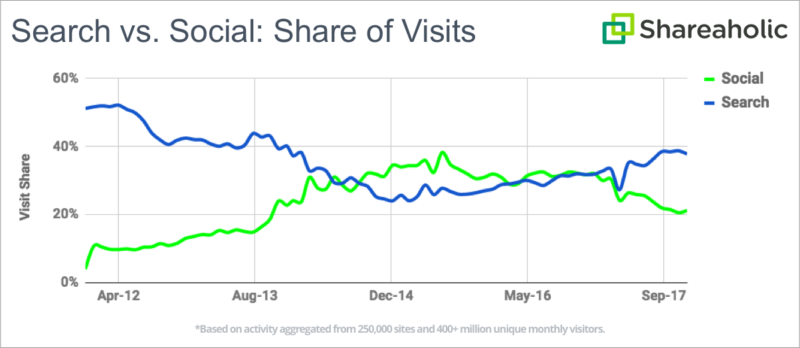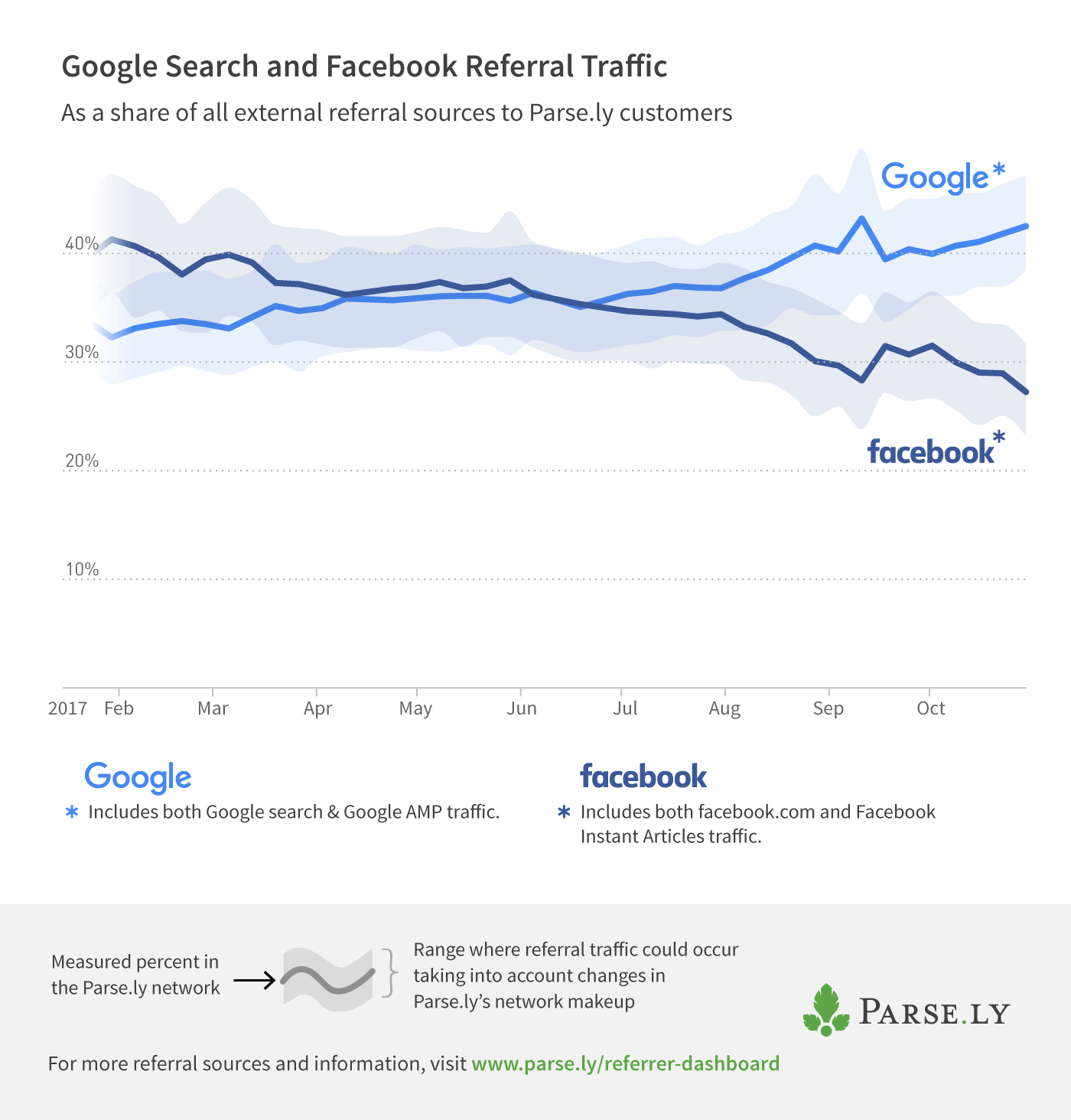Search outpaced social for referral traffic last year, driving 35% of site visits vs social’s 26% share of visits
According to a new referral traffic report from Shareaholic, 2017 was the first time since 2014 search owned a larger share of visits over social.
After a year fraught with terms like “fake news,” and headlines centering around brand safety issues and extreme content, it appears the actions taken by social sites to curb the influx of malicious content is turning out to be a real boon for search referral traffic.
For the first time since 2014, Shareaholic says search outpaced social in the percentage of overall traffic it delivered in 2017. According to the analytic platform’s data, search drove 34.8 percent of site visits in 2017 compared to social networks which accounted for 25.6 percent of referral traffic.
Chartbeat, an analytics platform for online publishers and media organizations, has witnessed a similar trend with traffic from Google search to publisher websites up more than 25 percent since the start of 2017.
“Google Search has always been the largest referrer to Chartbeat clients,” writes the company’s CEO, John Saroff, on Chartbeat’s blog, “In late August, Chartbeat data scientists noticed that Google Search referrals across our client base were trending up.”
The CEO says his team initially thought the rise in Google referrals were attached to events like last year’s solar eclipse and Hurricane Irma, but traffic continued to rise even after news headlines around the events subsided. Instead of falling back into normal patterns, Chartbeat saw Google search driving even more traffic to publisher sites.
Search beats out social for share of visits
“At a high level, it’s clear that social media’s tenuous grip on being the top referral category is over. After beating out search for the last three years, it’s given back the title, driven by changes to the algorithms behind Facebook’s News Feed,” writes Shareaholic in its latest traffic report.
Shareaholic’s findings are based on traffic to more than 250,000 mobile and desktop sites that have opted-in to the content marketing platform’s publishing tools. The company says it analyzed a variety of traffic sources — direct traffic, social referrals, organic search and paid search — for websites that ranged in size from a thousand monthly unique visitors to one million, and spread across a broad selection of website categories (food, tech, fashion and beauty, marketing, sports, general news, and more).
Google was the top overall traffic referrer for the year, and owned a 36.82 percent share of visits during the second half of 2017. While Google’s share of visits was up more than seven percentage points between the second half of 2016 and the second half of 2017, Facebook’s dropped 12.7 percent during the same time frame.
Even with a double-digit drop however, Facebook remained the top social network for share of visits in 2017.
Shareholic notes the changes Facebook has made to its news feed algorithm, boosting content from “trusted” news sources while penalizing spammy, click-bait headlines, influenced the site’s drop in share of visits: “After a rocky 2016 US election year, Facebook made a number of major changes to what content they display in the news feed and how they display it.”
The two charts below, one from Shareaholic and the other from Parse.ly convey similar trends with respect to search vs. social referral traffic in 2017, through the third quarter of the year. The Parse.ly data reflects the upward trend in referral traffic from Google (all – including AMP – Google’s Accelerated Mobile Pages format) and declining trend in referral traffic from Facebook specifically (all Facebook – including Instant Articles).

Search vs. Social Referral Traffic – 2017 from Shareaholic

Google Search and Facebook Referral Traffic – 2017 from Parse.ly
Publishers also see continued gains from search driven by AMP
While Shareaholic’s traffic referral report is based on a wide category of websites, Chartbeat’s data is specifically attached to publishers’ web traffic.
As mentioned earlier, Chartbeat saw a 25 percent surge in traffic to publisher sites by Google search over the last year. Josh Schwartz, Chartbeat’s chief of product, engineering and data, told Digiday that Facebook referrals to publishers was down fifteen percent in 2017 — aligning with Shareaholic’s findings.
Facebook’s news feed algorithm tweaks to curb fake news and spam content are definitely impacting its overall referral traffic numbers, but Chartbeat reports the most significant factor driving traffic to its clients’ sites is AMP content. After analyzing whether or not the rise in traffic was the result of a bug, or “un-darkening” of previously dark social traffic and finding nothing, Chartbeat turned its attention to mobile versus desktop traffic numbers.
“We then looked specifically at search traffic by device and the answer was clear from our dataset. Mobile Google Search referrals were up significantly while Desktop Google Search referrals were flat,” writes Saroff.
Chartbeat then dug further into its data to evaluate sites using AMP and said it found a “stark” difference between the sites using AMP and those that were not.
“While Mobile Google Search traffic to our AMP-enabled publishers is up 100 percent over the same time-frame, traffic to publishers not using AMP is flat.”
Chartbeat says, during the last six months, Google Mobile Search referrals now outpace both mobile and desktop Facebook referrals.
Contributing authors are invited to create content for Search Engine Land and are chosen for their expertise and contribution to the search community. Our contributors work under the oversight of the editorial staff and contributions are checked for quality and relevance to our readers. The opinions they express are their own.
Related stories
